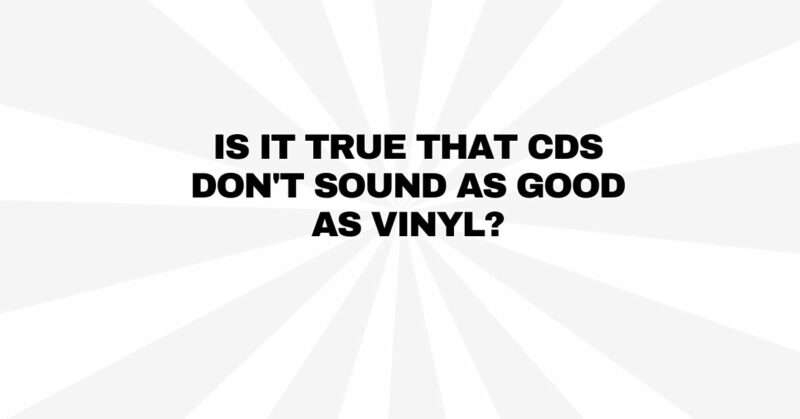The debate over the audio quality of CDs compared to vinyl records is a longstanding and passionate one within the audiophile and music enthusiast communities. Both formats have their unique characteristics, and opinions on which one sounds better often vary. In this article, we will delve into the factors that influence the perception of sound quality in CDs and vinyl records and explore the arguments from both sides of the debate.
CDs: The Digital Precision
Compact discs, or CDs, were introduced in the early 1980s and represented a significant leap forward in audio technology. They quickly became the dominant physical music format and offered several advantages over their analog predecessors. Here are some key attributes of CDs:
- Digital Clarity: CDs store music as digital data, utilizing a precise sampling and encoding process. This digital format eliminates the inherent imperfections associated with analog playback, such as surface noise, pops, and clicks. As a result, CDs provide clean, accurate, and faithful sound reproduction.
- Consistency: CDs offer consistent sound quality regardless of how many times they are played. Unlike vinyl records, which can degrade over time due to wear and tear from the stylus, CDs remain stable.
- Durability: CDs are robust and resistant to physical damage. They are not susceptible to scratches or warping, ensuring consistent sound quality over time.
- Artistic Packaging: Many CDs come with detailed artwork, lyrics, and booklets that enhance the overall music-listening experience.
Vinyl Records: The Analog Warmth
Vinyl records, with their analog format, have been cherished for their unique sound characteristics. Here are some key attributes of vinyl records:
- Analog Nature: Vinyl records store music as analog signals, etched into the surface as grooves. When played back with a turntable and stylus, the analog nature of vinyl provides a warm and organic sound that is often described as having character and depth.
- Dynamic Range: Vinyl records often offer a wider dynamic range than CDs. This means they can capture and reproduce subtle nuances in the music, such as the delicate plucking of a guitar string or the quietest whisper of a singer.
- Tactile Experience: Handling vinyl records adds a tactile and interactive dimension to the music-listening process. The ritual of selecting a record, placing the needle, and observing the spinning disc can enhance the overall enjoyment.
- Imperfections: Vinyl’s imperfections, such as surface noise and occasional pops and clicks, are considered part of its charm by many enthusiasts. These analog quirks contribute to a more authentic and engaging listening experience for some.
Subjective Sound Perception:
The perception of whether CDs sound as good as vinyl records is highly subjective and influenced by various factors:
- Personal Preferences: Ultimately, the preference for one format over the other often comes down to individual taste. Some listeners appreciate the precision and clarity of CDs, finding them more accurate and reliable for certain types of music. Others prefer the analog warmth and imperfections of vinyl records, valuing the character and nostalgia they bring to the listening experience.
- Equipment: The quality of the playback equipment, including the turntable or CD player, cartridge or laser, and speakers, significantly affects sound perception. High-quality equipment can make both formats shine, while subpar equipment may not do justice to either.
- Listening Environment: The acoustic properties of the room in which music is enjoyed can influence how one perceives sound quality. Factors such as room size, acoustics, and ambient noise can impact the listening experience.
- Music Genre: Some argue that certain genres, particularly those with acoustic instruments and rich instrumentation, benefit more from the analog warmth of vinyl. Others find that digital formats like CDs excel in capturing the clarity and precision needed for complex music compositions.
Conclusion:
In the debate over whether CDs sound as good as vinyl records, there is no definitive answer, as it largely depends on personal preferences, listening context, and individual experiences. Both formats have their strengths and unique qualities, and enthusiasts of each format appreciate them for different reasons.
Ultimately, what matters most is the emotional connection and enjoyment that music brings to the listener, regardless of the medium through which it is experienced. Whether it’s the clean precision of a CD or the analog warmth of a vinyl record, the power of music transcends the format, uniting listeners in their shared love for the art and emotion it conveys.


